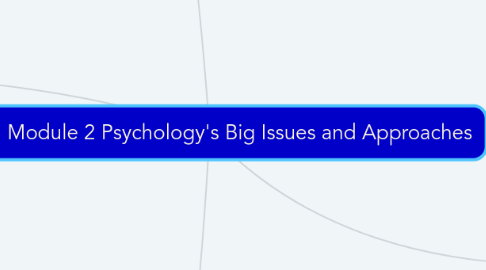
1. Psychology's Biggest Question
1.1. Do our traits exist at birth or do they develop as we gain experience?
1.1.1. Nature v. Nurture: the longstanding controversy over the relative contributions that genes and experience make to the development of psychological traits and behaviors
1.2. Natural Selection: principle that among the range of inherited trait variations, those contributing to reproduction and survival will most likely be passed on to offspring.
1.3. Nurture works on what nature endows
2. Psychology's Three Main Levels of Analysis
2.1. Levels of Analysis: differing, complementary views, from biological to psychological to sociocultural, for analyzing any given phenomenon
2.1.1. "Everything is related to everything else"
2.2. Biopsychosocial Approach: an integrated approach that incorporates all levels of analysis
2.3. Behavior or Mental Process
2.3.1. Biological Influences: natural selection, genetic predispositions, brain mechanisms, hormonal influences
2.3.2. Psychological Influences: learned fears and expectations, emotional responses, cognitive processing and perpetual interpretations
2.3.3. Social-Cultural Influences: presence of others, cultural/societal/family expectations, peer and other group influences, compelling models (media)
2.4. "Everything is related to everything else"
3. Psychology's Approaches
3.1. Behavior: study of observable behavior, and its explanation by principles of learning
3.2. Biological: study of the links between biological and psychological processes
3.3. Cognitive: the scientific study of all the mental activities associated with thinking
3.4. Evolutionary: the scientific study of the evolution of behavior and mind, using principles of natural selection
3.5. Psychodynamic: a branch of psychology that studies how unconscious drives and conflicts influence behavior
3.6. Socio-Cultural: study of how situations and cultures affect our behavior and thinking
4. Psychology's Subfields
4.1. psychology is united by a common quest: describing and explaining the behavior and the mind underlying it
4.2. Psychometrics: the scientific study of the measurement of human abilities, attitudes, and traits
4.3. Biological Scientists exploring the links between brain and minds
4.3.1. Applied Research: scientific study that aims to solve practical problems
4.3.2. Social Psychology: the study of how we think about, influence, and relate to one another
4.3.3. Developmental Psychology: branch that studies physical, cognitive, and social change throughout the life span
4.3.4. Cognitive Psychologists experiment with how we perceive, think, and solve problems.
4.3.5. Educational psychology: the study of how psychological processes affect and can enhance teaching and learning
4.3.6. Personality Psychology: the study of an individual's characteristic pattern of thinking, feeling and acting
4.4. Industrial-Organizational Psychology: the application of psychological concepts and methods to optimize human behavior in workplaces
4.4.1. Human Factors Psychology: subfield of I/O psychology that explores how people and machines interact and how marches and physical environments can be made safe
4.5. Psychology is a helping profession and bases interventions based on evidence of effectiveness
4.5.1. Positive Psychology: scientifically explores human functioning with the goals of discovering and promoting strengths and virtues that help people thrive
4.5.2. Counseling Psychology: branch that assists people with problems in living and in achieving greater well-being
4.5.3. Clinical Psychology: a branch that studies, assesses, and treats people with psychological disorders
4.5.4. Psychiatry: branch of medicine dealing with psychological disorders; practiced by physicians who sometimes provide medical treatments as well as therapy
4.5.5. Community Psychology: branch that studies how people interact with their social environments and how institutions affect individuals and groups

